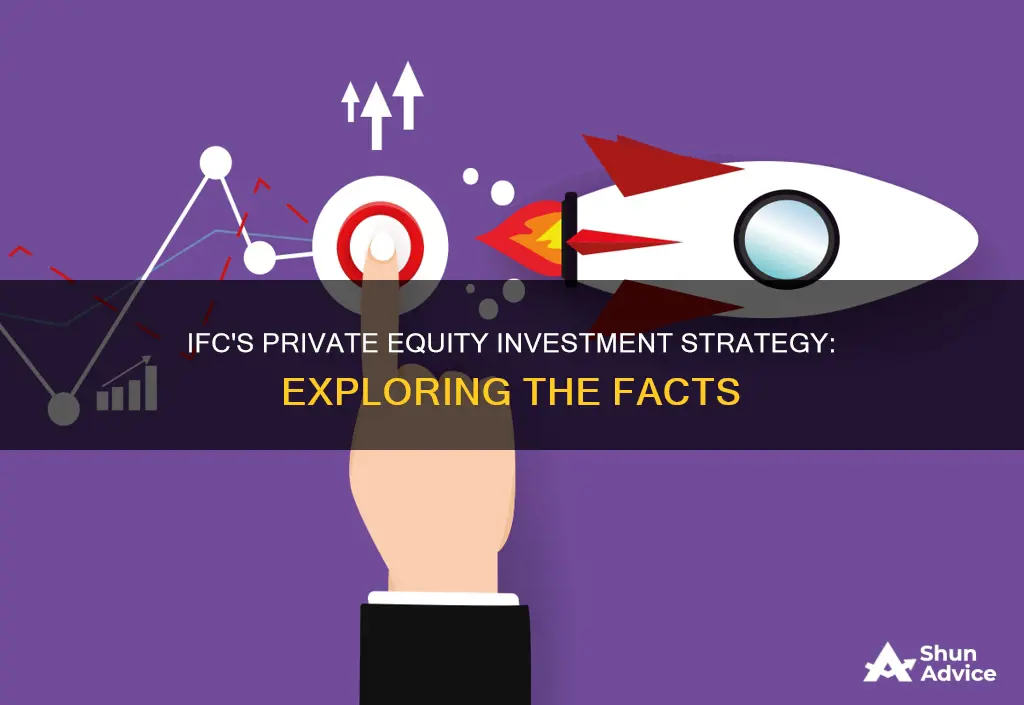
The International Finance Corporation (IFC) is an international financial institution that offers investment, advisory, and asset-management services to encourage private-sector development in less developed countries. Owned by 186 member countries, the IFC aims to promote development by providing debt and equity to the private sector through a range of benchmark and bespoke products. This includes investing directly in companies' and financial institutions' equity and through private-equity funds. By providing capital in emerging markets, the IFC plays a critical role in supporting local firms that typically lack access to finance, helping to drive sustainable growth, promote innovation, and provide essential goods and services. The IFC's private-equity portfolio stands at roughly $3.0 billion committed to about 180 funds, with investments made either directly or via private-equity funds, generally ranging from five to twenty percent of a company's total equity.
| Characteristics | Values |
|---|---|
| Investment type | Debt and equity |
| Investment focus | Private sector, emerging markets, developing countries |
| Investment products | Benchmark and bespoke products, risk capital, profit-participating loans, convertible loans, preferred shares |
| Investment percentage | 5% to 20% of a company's equity |
| Investment period | Long-term (8 to 15 years) |
| Exit strategy | Sale of shares on a domestic stock exchange, initial public offering |
| Investment amount | $12.18 billion in total funding commitments in 2011 |
| Number of funds | 180 funds |
| Fund value | $3.0 billion |
What You'll Learn

IFC's role in emerging markets
The International Finance Corporation (IFC) is an international financial institution that offers investment, advisory, and asset-management services to encourage private-sector development in less developed countries. It is the largest global development institution focused on the private sector in emerging markets. It works in more than 100 countries, using its capital, expertise, and influence to create markets and opportunities in developing countries.
By investing in funds focusing on emerging markets, IFC can expand its support to promising local firms that would typically lack access to finance. In addition to funding, IFC works with its partner fund managers to facilitate network connections and bring the expertise that companies need to scale. IFC boosts the expansion of fast-growing mid-sized companies and prepares them for an eventual IPO or buy-out.
IFC also works to increase gender equality and promote gender-lens investing. It supports best practices in corporate governance by sourcing and nominating highly qualified professionals to serve on the boards of investee companies.
In fiscal year 2024, IFC committed a record $56 billion to private companies and financial institutions in developing countries, leveraging private sector solutions and mobilizing private capital to create a world free of poverty on a livable planet.
Understanding WPR in Finance and Investment Management
You may want to see also

IFC's private equity portfolio
The International Finance Corporation (IFC) is an international financial institution that offers investment, advisory, and asset-management services. It is a member of the World Bank Group and is owned by 186 member countries.
IFC invests in companies' equity directly and through private equity funds. The corporation generally invests between 5% and 20% of a company's equity. IFC encourages the companies it invests in to broaden share ownership through public listings, deepening local capital markets.
IFC also provides risk capital and advice to fund managers and entrepreneurs in challenging markets. The corporation works with its partner funds and investee companies to increase gender equality and promote gender-lens investing.
IFC's private equity investments have helped create an estimated 300,000 new jobs between 2000 and 2011. The average rate of job growth for companies IFC invested in during this period was more than 15%.
Personal Investment Management: Excel for Financial Freedom
You may want to see also

IFC's investment range
The International Finance Corporation (IFC) is an international financial institution that offers investment, advisory, and asset-management services. It is owned by 186 member countries and is rated AAA/Aaa. The IFC's mission is to promote development by providing debt and equity to the private sector through a range of benchmark and bespoke products.
IFC's investment services include loans, equity, trade finance, syndicated loans, structured and securitized finance, client risk management services, treasury services, and liquidity management. The IFC invests in companies directly and through private equity funds, generally acquiring between 5% and 20% of a company's equity. They encourage their investees to broaden share ownership through public listings to deepen local capital markets. The IFC also invests through profit-participating loans, convertible loans, and preferred shares.
IFC's private equity portfolio stands at roughly $3 billion, committed to about 180 funds, with a wide distribution across regions, including Africa, East Asia, South Asia, Eastern Europe, Latin America, and the Middle East. The IFC has recently invested in Small Enterprise Assistance Funds' (SEAF) Caucasus Growth Fund, Aureos Capital's Kula Fund II (Papua New Guinea, Fiji, Pacific Islands), and Leopard Capital's Haiti Fund.
The IFC also established the IFC Asset Management Company LLC (IFC AMC) in 2009 as a wholly-owned subsidiary to manage all capital funds to be invested in emerging markets. The AMC manages capital mobilized by the IFC and third parties, such as sovereign or pension funds, and other development financing organizations. The AMC has raised $10.1 billion across regional, sector-focused, and fund-of-funds, reflecting the broad reach of IFC's investment platform.
In fiscal year 2024, the IFC committed a record $56 billion to private companies and financial institutions in developing countries, leveraging private sector solutions and mobilizing private capital to create a world free of poverty and promote sustainable growth.
Wealth Management: Exploring Investment Vehicle Options
You may want to see also

IFC's role in job creation
The International Finance Corporation (IFC) is an international financial institution that offers investment, advisory, and asset-management services to encourage private-sector development in less developed countries. The IFC is a member of the World Bank Group and is owned by 186 member countries.
The IFC's role in job creation is significant, as it aims to promote development and reduce poverty by providing debt and equity to the private sector. The IFC believes that the private sector is critical to creating more and better jobs, as it accounts for nine out of ten jobs globally. By investing in private businesses in over 100 countries, the IFC fosters the right kind of job growth.
The IFC works to ensure that the jobs created are sustainable, productive, offer fair pay, higher wages, and good working conditions. They also focus on creating opportunities for both men and women, including youth, and providing avenues for advancement. In 2012, IFC clients directly supported nearly 3 million jobs.
The IFC also works with financial institutions to increase lending to micro, small, and medium enterprises, which, in turn, employ a large number of people. They recognize that direct jobs are only a small part of the story and estimate that across value chains, every direct job may lead to as many as 20 indirect jobs.
Furthermore, the IFC plays a leading role in helping businesses and governments identify ways to strengthen employment. They conduct studies and work with international finance institutions to address the main constraints to job creation, such as inadequate infrastructure, limited access to finance, weak investment climate, and insufficient skills and training.
Equity Investments: Halal or Haram?
You may want to see also

IFC's investment in SMEs
The International Finance Corporation (IFC) is an international financial institution that offers investment, advisory, and asset-management services to encourage private-sector development in less developed countries. The IFC is owned by 186 member countries and is consistently rated AAA/Aaa.
IFC has a specific focus on investing in small and medium-sized enterprises (SMEs) in emerging markets, recognising their critical role in fostering economic growth and job creation. To address the funding gap faced by SMEs, IFC launched the SME Ventures Program in 2010. This program invests in private equity funds managed by local investment managers, focusing on SMEs in IDA-eligible countries and fragile states. The program provides capital and works with fund managers to improve their ability to support SMEs with networks, market expertise, and know-how. As of 2023, the SME Ventures Program has a presence in over 24 portfolio funds globally, including in the Kyrgyz Republic, Guatemala, the Democratic Republic of Congo, and Cambodia.
IFC also advises and invests in financial institutions to promote SME growth in emerging economies. Their SME Finance Investment Services aim to address the estimated $5.2 trillion gap in SME financing worldwide. IFC provides a range of investment solutions, including debt, equity, loans, syndicated loans, trade finance, and structured finance. In 2018, 7.9 million SMEs received $360.6 billion in loans from financial intermediaries funded by IFC.
IFC's support for SMEs extends to women-owned businesses, which face unique challenges in accessing finance and growing their enterprises. IFC is an implementing partner for the Women Entrepreneurs Finance Initiative (We-Fi), providing investment and advisory services to expand financial services and market access for women-owned firms. IFC has also partnered with Union Bank to support Nigerian SMEs and women-led businesses.
IFC's investment in private equity:
IFC provides debt and equity to the private sector through various products, including direct investments in companies and financial institutions. They generally invest between 5% and 20% of a company's equity and encourage public listings to deepen local capital markets. IFC also invests through profit-participating loans, convertible loans, and preferred shares.
IFC's private equity portfolio stands at approximately $3 billion, committed to about 180 funds globally, including regions such as Africa, East Asia, South Asia, Eastern Europe, Latin America, and the Middle East. By investing in private equity funds, IFC aims to support the development of dynamic, job-creating companies that drive sustainable growth, promote innovation, and provide essential goods and services.
Value Investing: Why an All-Value Portfolio is a Smart Move
You may want to see also
Frequently asked questions
The International Finance Corporation (IFC) is an international financial institution that offers investment, advisory, and asset-management services to encourage private-sector development in less developed countries.
Yes, the IFC invests in private equity through a range of benchmark and bespoke products. The IFC invests in companies' equity directly and through private-equity funds.
The IFC generally invests between 5% and 20% of a company's equity.
The IFC's mission is to promote development by providing debt and equity to the private sector. The IFC aims to create opportunities for people to escape poverty and achieve better living standards by mobilizing financial resources for private enterprises.
The IFC provides developmental support and long-term growth capital to private enterprises. The IFC also works with its partner fund managers to facilitate network connections and bring the expertise that companies need to scale.







